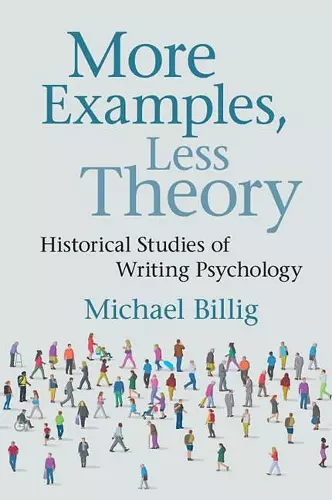More Examples, Less Theory
Historical Studies of Writing Psychology
Format:Paperback
Publisher:Cambridge University Press
Published:3rd Oct '19
Should be back in stock very soon
This paperback is available in another edition too:
- Hardback£98.00was £98.00(9781108498418)

This insightful book argues for the significance of examples in psychology, showcasing influential figures and their contributions. More Examples, Less Theory emphasizes practical insights over theoretical abstractions.
In More Examples, Less Theory, Michael Billig presents a compelling case for the importance of examples in the field of psychology. By revisiting the works of prominent psychologists like Freud, William James, and Kurt Lewin, he sheds new light on their contributions and emphasizes how their use of examples can inform contemporary psychological practices. The book is designed for psychologists, social scientists, and students, making it accessible to a broad audience interested in the intricacies of psychological thought.
Billig argues that the current trend in psychology often prioritizes theoretical frameworks over practical examples, which can lead to a disconnect between theory and real-world applications. He provides a series of historical studies that not only analyze the works of well-known figures but also highlight those who have been overlooked, such as the Earl of Shaftesbury and Abraham Tucker. By doing so, he champions a richer understanding of psychology that values the depth and nuance offered by individual cases and examples.
The book also includes a cautionary chapter on Jacques Lacan, illustrating the potential pitfalls of neglecting examples in favor of complex theories. With a focus on Marie Jahoda as a prime example of a psychologist whose work transcends time, More Examples, Less Theory encourages readers to reconsider how they approach the study of the mind. This engaging read promises to inform and entertain, appealing especially to those who appreciate the richness of detail that examples provide over abstract theories.
'In this highly readable work, Michael Billig makes a compelling argument that good examples do far more to advance and enliven theory than fancy jargon ever could. Students and seasoned writers of psychology will find inspiration in his engaging investigation into some of the most effective communicators in psychology's past.' Alexandra Rutherford, York University, Toronto
'A common tendency of psychologists is to describe phenomena through the lens of their own pre-existing theories, thus making phenomena resemble their theories rather than vice versa. In this book, Michael Billig argues for a fundamental reversal of psychology's methodological habits, emphasising the value of 'particularising' psychological insights through the use of richly detailed examples, thus subsuming the general within the specific rather than the opposite. It is a lesson that could invigorate psychology, underscoring how the use of concrete examples helps us see and empathise and remember in ways that theoretical accounts rarely do. Through various case studies, Billig shows how we can learn as well as teach by example.' David E. Leary, University of Richmond
'The truth is in the details, not in abstract theory. In his new book, Michael Billig shows us how examples can lead to a better understanding of psychological issues. Analysing the thinking and writing of eminent psychologists, he offers the reader a rich and intriguing alternative history of psychology.' Ruud Abma, Universiteit Utrecht, the Netherlands
'This thought-provoking and important book by one of the principal scholars in contemporary psychology and social science makes a strong case for investigating human lives as they are lived, rather than searching for universally applicable theories by means of narrowly controlled experimental research.' Christine Griffin, University of Bath
'Billig insists that examples are in rhetorical tension to theory. Here there is something gently subversive about More Examples, [Less Theory]. For the book is not just about writing or the use of examples. It is also a scornful critique of that most sacred of modern academic shibboleths: doing theory and being theoretical.' Michael Marinetto, Times Higher Education
'Michael Billig's book puts many basic psychological ideas and approaches in their time and place and describes the minds, personalities, situations and histories of their protagonists. It helps the reader to see where psychology had come from, and why it is like it is. At the end Billig adds a few modest but welcome recommendations for young psychologists. I hope this book becomes a standard text for psychologists early in their studies. I for one should have been greatly helped if Michael Billig's book had been available when I started out.' John Richer, Human Ethology
'Starting with the examples of nine very different writers, he selects an exemplary work from each of them and discusses the use (or sometimes neglect) of examples within that work. Furthermore, since most of the chapters are based on material presented in Billig's previously published works, they provide examples of one thoughtful scholar's concerns and interests over a long and productive career.' Raymond E. Fancher, Journal of the History of the Behavioral Sciences
ISBN: 9781108736022
Dimensions: 228mm x 152mm x 16mm
Weight: 430g
292 pages